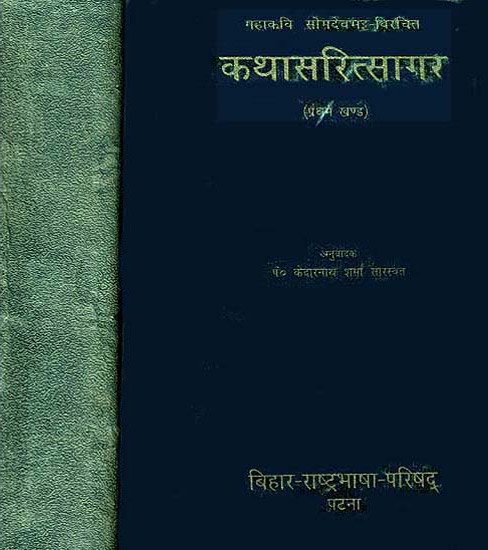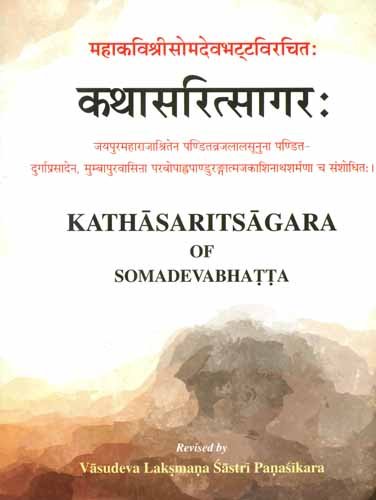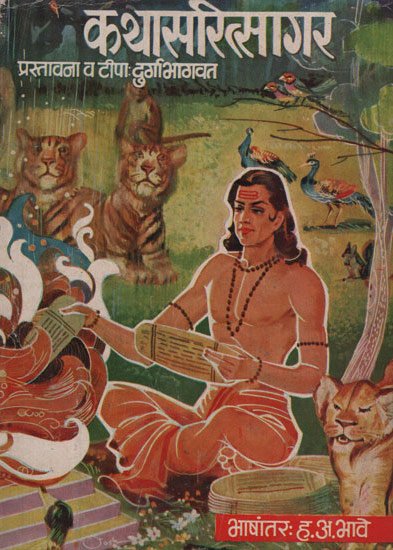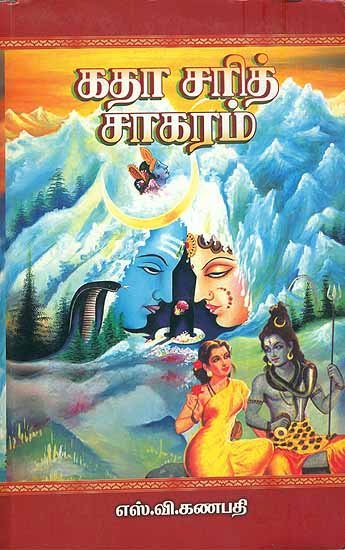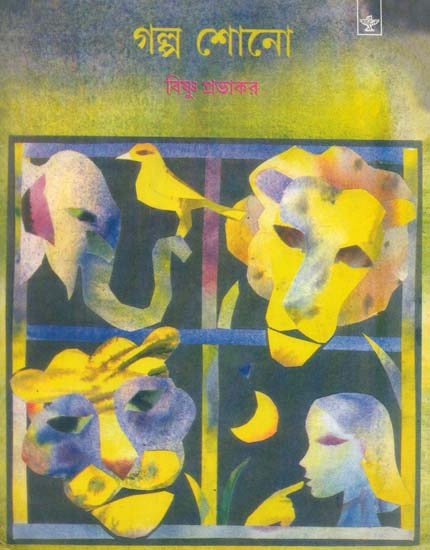Kathasaritsagara [sanskrit]
by C. H. Tawney | 2014 | 226,424 words | ISBN-13: 9789350501351
The Sanskrit edition of the Kathasaritsagara referencing the English translation and grammatical analysis. Written by Somadeva and dating from the 12th century, the Kathasaritsagara (or Katha-sarit-sagara) represents an epic legend narrating the adventures of Naravahanadatta as he strives to become the destined emperor of the Vidyadharas. Alternative titles: (Kathāsaritsāgara, कथासरित्सागर, Kathā-sarit-sāgara)
Verse 18.5.249
इत्येषा शशिशेखरेण तुहिनक्ष्माभृत्सुताभ्यर्थनात् सोत्साहेन बृहत्कथा निगदिता कैलासपृष्ठे पुरा ।
उत्पन्नैर् अथ शापतः क्षितितले कात्यायनाद्याकृतीर् बिभ्रद्भिर् गमिता प्रसिद्धिमतुलां तैः पुष्पदन्तादिभिः ॥ २४९ ॥
ityeṣā śaśiśekhareṇa tuhinakṣmābhṛtsutābhyarthanāt sotsāhena bṛhatkathā nigaditā kailāsapṛṣṭhe purā |
utpannair atha śāpataḥ kṣititale kātyāyanādyākṛtīr bibhradbhir gamitā prasiddhimatulāṃ taiḥ puṣpadantādibhiḥ || 249 ||
The English translation of Kathasaritsagara Verse 18.5.249 is contained in the book The Ocean of Story by C.H. Tawney. This book is available online or you could buy the latest edition:
Read online Buy now! The English translation by C.H. Tawney (2014)
Glossary of Sanskrit terms
Note: This extracts Sanskrit terms and links to English definitions from the glossary, based on an experimental segmentation of verse (18.5.249). Some terms could be superfluous while some might not be mentioned. Click on the word to show English definitions.
Iti, Itya, Esha, Shashishekhara, Tuhinakshmabhrit, Tan, Abhyarthana, Sotsaha, Brihatkatha, Nigadita, Kailasa, Prishthe, Prishtha, Pura, Pur, Utpanna, Atha, Shapa, Tas, Kshititala, Katyayana, Akriti, Bibhrat, Gamita, Prasiddhimat, Ula, Tad, Pushpadanta,
Analysis of Sanskrit grammar
Note: this is an experimental feature and only shows the first possible analysis of the Sanskrit text (Kathasaritsagara Verse 18.5.249). If the system was successful in segmenting the sentence, you will see of which words it is made up of, generally consisting of Nouns, Pronouns, Verbs, Participles and Indeclinables. Click on the link to show all possible derivations of the word.
- Line 1: “ityeṣā śaśiśekhareṇa tuhinakṣmābhṛtsutābhyarthanāt sotsāhena bṛhatkathā nigaditā kailāsapṛṣṭhe purā ”
- itye -
-
iti (indeclinable particle)[indeclinable particle]iti (noun, feminine)[compound], [adverb], [nominative dual], [vocative dual], [accusative dual]itya (noun, masculine)[locative single]itya (noun, neuter)[nominative dual], [vocative dual], [accusative dual], [locative single]ityā (noun, feminine)[nominative dual], [vocative single], [vocative dual], [accusative dual]√i -> itya (participle, masculine)[locative single from √i class 2 verb]√i -> itya (participle, neuter)[nominative dual from √i class 2 verb], [vocative dual from √i class 2 verb], [accusative dual from √i class 2 verb], [locative single from √i class 2 verb]√i -> ityā (participle, feminine)[nominative dual from √i class 2 verb], [vocative single from √i class 2 verb], [vocative dual from √i class 2 verb], [accusative dual from √i class 2 verb]
- eṣā -
-
eṣā (noun, feminine)[nominative single]
- śaśiśekhareṇa -
-
śaśiśekhara (noun, masculine)[instrumental single]
- tuhinakṣmābhṛtsu -
-
tuhinakṣmābhṛt (noun, masculine)[locative plural]
- tā -
-
ta (noun, masculine)[compound], [vocative single]ta (noun, neuter)[compound], [vocative single]tan (noun, masculine)[compound], [nominative single]tā (noun, feminine)[nominative single]
- abhyarthanāt -
-
abhyarthana (noun, neuter)[adverb], [ablative single]
- sotsāhena -
-
sotsāha (noun, masculine)[instrumental single]sotsāha (noun, neuter)[instrumental single]
- bṛhatkathā* -
-
bṛhatkathā (noun, feminine)[nominative plural], [vocative plural], [accusative plural]
- nigaditā -
-
nigaditā (noun, feminine)[nominative single]
- kailāsa -
-
kailāsa (noun, masculine)[compound], [vocative single]
- pṛṣṭhe -
-
pṛṣṭhe (indeclinable)[indeclinable]pṛṣṭha (noun, neuter)[nominative dual], [vocative dual], [accusative dual], [locative single]
- purā -
-
purā (indeclinable)[indeclinable]pur (noun, feminine)[instrumental single]purā (noun, feminine)[nominative single]
- Line 2: “utpannair atha śāpataḥ kṣititale kātyāyanādyākṛtīr bibhradbhir gamitā prasiddhimatulāṃ taiḥ puṣpadantādibhiḥ ”
- utpannair -
-
utpanna (noun, masculine)[instrumental plural]utpanna (noun, neuter)[instrumental plural]
- atha -
-
atha (indeclinable)[indeclinable]
- śāpa -
-
śāpa (noun, masculine)[compound], [vocative single]
- taḥ -
-
tas (noun, masculine)[compound], [vocative single]tas (noun, neuter)[compound], [nominative single], [vocative single], [accusative single]ta (noun, masculine)[nominative single]
- kṣititale -
-
kṣititala (noun, neuter)[nominative dual], [vocative dual], [accusative dual], [locative single]
- kātyāyanād -
-
kātyāyana (noun, masculine)[adverb], [ablative single]kātyāyana (noun, neuter)[adverb], [ablative single]
- yā -
-
yā (indeclinable relative)[indeclinable relative]i (noun, masculine)[compound], [adverb], [nominative dual], [vocative dual], [accusative dual]ī (noun, feminine)[compound], [adverb]ī (noun, masculine)[compound], [adverb]e (noun, masculine)[adverb]yā (noun, feminine)[nominative single]yā (pronoun, feminine)[nominative single]
- ākṛtīr -
-
ākṛti (noun, feminine)[accusative plural]ākṛtī (noun, feminine)[accusative plural]
- bibhradbhir -
-
bibhrat (noun, masculine)[instrumental plural]bibhrat (noun, neuter)[instrumental plural]
- gamitā -
-
gamitā (noun, feminine)[nominative single]√gam -> gamitā (participle, feminine)[nominative single from √gam]
- prasiddhimat -
-
prasiddhimat (noun, masculine)[compound]prasiddhimat (noun, neuter)[nominative single], [vocative single], [accusative single]
- ulā -
-
ula (noun, masculine)[compound], [vocative single]
- am -
-
a (noun, masculine)[adverb], [accusative single]ā (noun, feminine)[adverb]e (noun, masculine)[accusative single]
- taiḥ -
-
ta (noun, masculine)[instrumental plural]ta (noun, neuter)[instrumental plural]tad (noun, neuter)[instrumental plural]sa (noun, masculine)[instrumental plural]
- puṣpadantād -
-
puṣpadanta (noun, masculine)[adverb], [ablative single]puṣpadanta (noun, neuter)[adverb], [ablative single]
- ibhiḥ -
-
i (noun, masculine)[instrumental plural]
Other editions:
Also see the following editions of the Sanskrit text or (alternative) English translations of the Kathasaritsagara Verse 18.5.249
Kathasaritsagar
by Kedarnath Sharma Saraswat (2005)
The Only Edition with the Sanskrit Text and its Hindi Translation (An Old and Rare Book) Set of 3 Vol.
Buy now!
Kathasaritsagara of Somadeva Bhatta (Sanskrit Text Only)
by Vasudeva Laksmana Sastri (2013)
Katha Sarit Sagar in Marathi
by H. A Bhave (1995)
Set of 5 Volumes; Published by Varada Books, Pune. 2256 pages (Throughout B/W Illustrations).
Buy now!
Katha Sarit Sagara (Tamil)
by S. V. Ganapati (எஸ். வி. கணபதி) (2014)
[கதா சரித் சாகரம்] Published by Alliance Publications.
Buy now!
Galpa Shono
by Abhijit Chattopadhyay (2014)
[গল্প শোনো] Galpa Shono: Bengali Translation of 'Suno Kahani From Katha Sarit Sagar'; 9788126015436; Published by Sahitya Akademi, Delhi.
Buy now!Preview of verse 18.5.249 in Bengali sript:
ইত্যেষা শশিশেখরেণ তুহিনক্ষ্মাভৃত্সুতাভ্যর্থনাত্ সোত্সাহেন বৃহত্কথা নিগদিতা কৈলাসপৃষ্ঠে পুরা ।
উত্পন্নৈর্ অথ শাপতঃ ক্ষিতিতলে কাত্যাযনাদ্যাকৃতীর্ বিভ্রদ্ভির্ গমিতা প্রসিদ্ধিমতুলাং তৈঃ পুষ্পদন্তাদিভিঃ ॥ ২৪৯ ॥
![Kathasaritsagara [sanskrit] - book cover](/uploads/a/Katha-Sarit-Sagara.jpg)
